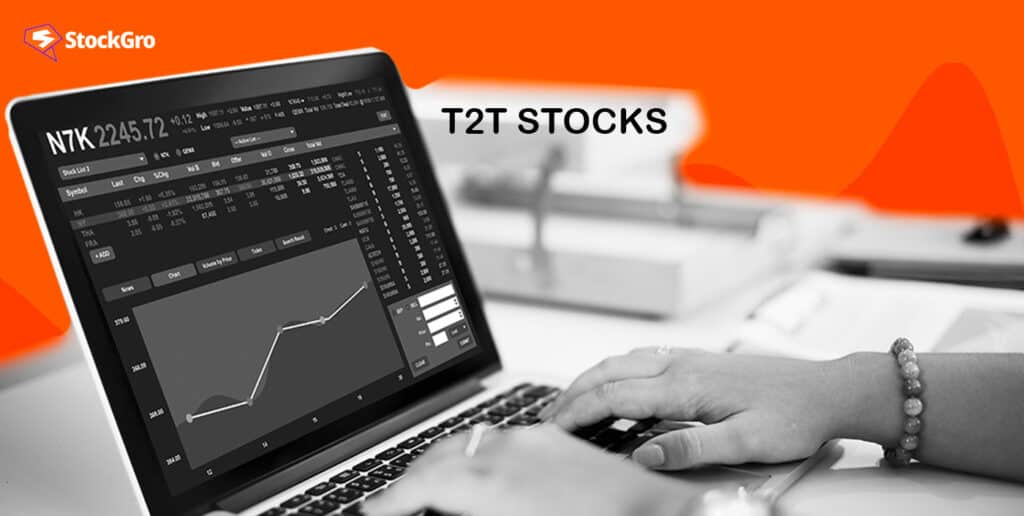
The share market is a vast arena where investors trade stocks of listed companies. Despite the attractiveness of the possible rewards, familiarity with the complex set of rules and regulations that control the industry is necessary.
T2T, or “trade to trade” stocks, is one such element that investors should be aware of. This article will look into T2T stocks and how you can trade such stocks in the market.
What is a T2T stock?
Stocks that are required to be delivered before they may be traded are known as T2T stocks or trade-to-trade stocks. These shares can’t be traded intraday or, as with BTST (Buy Today, Sell Tomorrow).
So, until the T+2 settlement happens, you cannot sell any Trade to Trade shares you bought today. Your order will be rejected if you attempt to sell these units on that day or before the units are in the demat account.
To protect investors from and prevent undue speculation on these stocks, SEBI places stocks in the T2T sector. Exchanges transfer equities to the Trade to Trade segment every two weeks, based on quarterly reviews. While the BSE places T2T shares in Group T, the NSE places them in the ‘BE’ series.
Factors used to classify stocks as T2T include, but aren’t restricted to, market capitalisation, price volatility, and price-to-earnings overvaluation.
Also read: Understanding blue chip stocks – Meaning, features and their safety
Example of a T2T share trade
Suppose you are keen to trade the stocks of a particular company at 520 rupees per share right now. According to the exchanges, this specific company’s stock is designated as trade-to-trade.
You decide to purchase 50 shares of the company’s stock. You deposit 26,000 rupees (₹520*50 shares) to finalise the transaction.
You won’t see the 50 shares you purchased deposited into your Demat account until the end of the next day, as the stock market operates on a T+1 trade settlement cycle.
You cannot sell these shares until they are transferred to your demat account. The exchange will reject your sell order if you try to place it until the shares are credited.
Also read: How to compare stocks? Explore the various tools available.
How can you identify trade-to-trade stocks?
Below is a list of the criteria used before placing a share in the trade to trade category that you may use to identify T2T stocks.
- Price-to-earning ratio
The BSE and NSE move the stock to the T2T sector if its value is higher than the price-to-earnings (P/E) ratio. For example, the stock is suitable for transfer to T2T, if the Nifty is between 10-15 and its P/E is 25. Earnings per share of stock serve as the basis for the P/E analysis.
- Price variation
Second, there’s the fluctuation in prices. Assume, that the stock’s value is about 25% higher than the Sensex or the particular sectoral index against which it is measured. This factor raises the possibility of considering the shares for a transfer to T2T.
- Market capitalisation
Stocks with a market value of less than ₹500 crores can be transferred to Trade to Trade stocks.
How to trade in the T2T segment in the share market?
To engage in trading in the T2T section, you can take these steps:
If you want to purchase shares, you must accept the trade upon delivery and pay the required amount. Remember that you can’t sell shares until you have delivery in your demat account, so be sure to check that during the trading process.
This section does not permit intraday trading after shares are sold. For that reason, on the T+1 date (trade day+1 day), the investor must have the delivery in their demat account and be able to trade it. If T+1 is not provided, the shares will be immediately auctioned off, which could lead to significant losses for investors and penalties for the broker.
Each transaction must ultimately result in the delivery of such stocks, where payment of the agreed-upon sum and the delivery of shares are required. The positions of Buy Today and Sell Tomorrow (BTST) and Sell Today and Buy Tomorrow (STBT) are not covered here.
Also read: What are cyclical and non-cyclical stocks?
Conclusion
The T2T or trade-to-trade segment may seem complex at first, but grasping it is essential for wise investors. By knowing the rules around T2T stocks, you can avoid potential losses and trade while following all regulations. Stay informed about T2T stocks for safe, profitable investing.